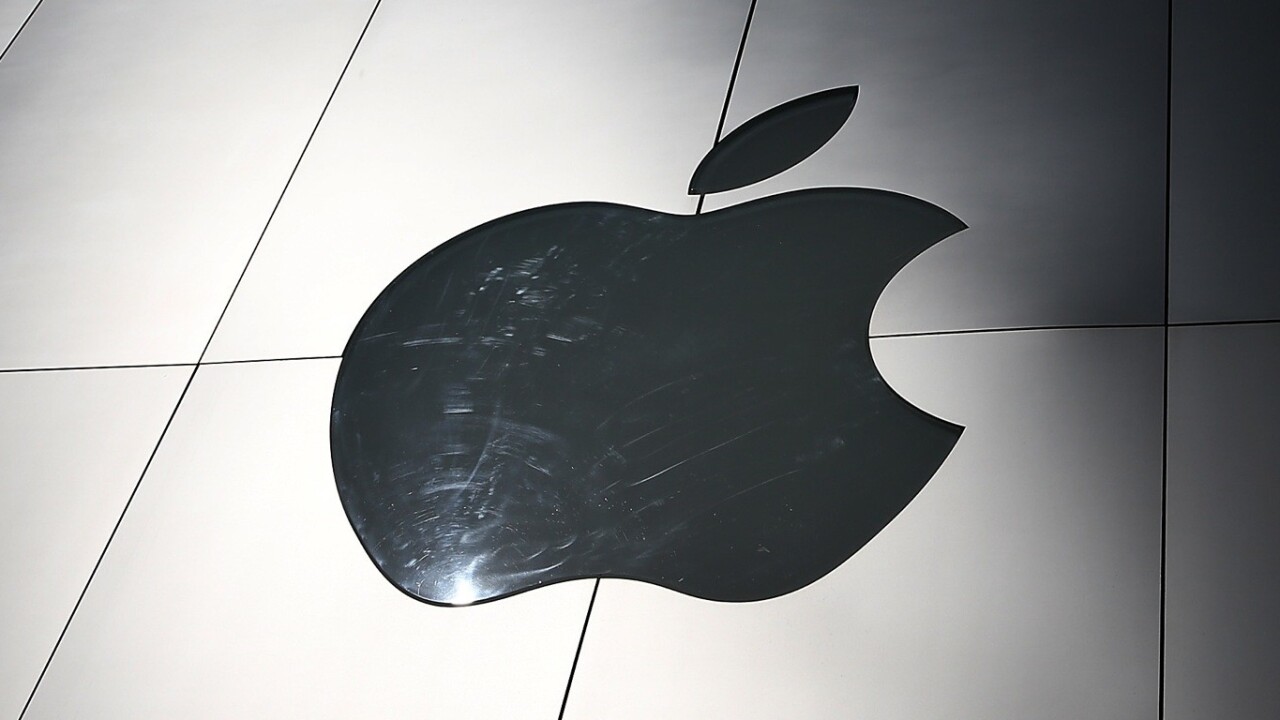
Jonny Haskins has a theory about Apple’s iWatch. It was originally published on his own blog, Pixel Lounge.
Like many people, I enjoy guessing as to what technology is going to bring and what innovations will transform our lives. The quicker we all innovate, the quicker I will be to owning my life’s dream – that flying car (it better be in my lifetime!).
In today’s world, things are so mundane and boring, so drip-fed to us commercially and unsystematically, that our dreams of the future are comparatively dull. An exception is Elon Musk who seems to be the one person in the world who’s challenging this approach and is not scared about taking on the auto industry with his electric Tesla’s and hovering rockets, not to mention the challenging foray of other ideas like a levitating Hyperloop train in a vacuum tube.
Now when I say boring, I am frustrated with the perpetual cycle of marketing bullcrap we are fed as consumers. Mobile phones are a perfect example of this spiral. We are allured to the newest devices on offer because of some minor improvement that was actually invented many years ago, but we just weren’t allowed to have it before.
Apple is a company that gained fame for bringing tomorrow’s technology to us today. Its history is impressive and we’ve often come to rely on owning something new. However, over the past few years, its stream of ‘awe-inspiring’ products seems to have dried up a bit, or at least hit a blockage in the pipe of creativity and innovation.
Is it just me who feels this? No. The Internet speaks about it all the time – there’s volumes of discussions out there – and Apple’s share value has consequently taken the hit as a direct result. Apple’s stock price hit its highest point in September 2012 at $700 which then slid to today’s value of around $500. Why is it that a company that has more resources than it has ever had cannot compete on the stock market with Google and Amazon, whose shares continue to rise?

That said, I believe we are finally about to rejoice with a new product launch on September 10, 2013. No, I’m not talking about the iPhone 5S… boring, the iPhone 5c… boring, or even the audacious iPhone gold/champagne edition…. are you serious? Changing colours is hardly going forwards! What I am talking about is the Apple TV, the iTV, a physical TV with full software integration and one that is going to be called the iWatch. That’s right, it’s been staring us in the face for a long time, but intentionally, or unintentionally as the name has acted as a decoy.
It’s been long known that Steve Jobs wanted to invade our living rooms with a TV, but the fact that it’s taken such a long time to come to the light suggests there is some huge fundamental change on the cards. He’s famously quoted in Walter Isaacson’s biography as saying, “I’d like to create an integrated television set that is completely easy to use.”
In December 2012, Tim Cook said in an NBC interview, “When I go into my living room and turn on the TV, I feel like I have gone backwards in time by 20 to 30 years…It’s an area of intense interest. I can’t say more than that.”
Direct from the horse’s mouth.
My research into all the murmurings about a TV Apple-like device shows it’s more than a figment of my (or Jobs’) imagination. There are exceptional reasons to believe this is about to happen. Let’s look at some of the facts and arguments to prove these wild claims of mine.
Why is it not a watch? I want a watch, dammit!
I don’t feel like I actually need to elaborate on this much. A watch just doesn’t make sense, especially for Apple. I might be wrong in saying this, but don’t you think it would flop as a product?
A watch is for fashion and sometimes for telling the time. It’s certainly not for taking phone calls – you’d look like you were trying to lick your elbow. If it’s not mobile friendly, what is its purpose? It barely has one. Practical reasons for a watch not making sense have been highlighted by Gizmodo.
First, the concept has been around for decades and has failed every time. Secondly, it doesn’t stack up economically, as it won’t appeal to the masses. Apple doesn’t do niche products, as they would tarnish its overall reputation. To elaborate further, your mother will make calls on an iPhone, she may watch a movie on an iPad, but she will most certainly not be wearing a James Bond smart watch.
Fashion territory is not for everyone; most people don’t brag about being a geek (geeks forget that, I often discover). Perhaps we may see a low priority product that slips onto the shelves like an accessory, but if I was Apple I wouldn’t be investing my resources in it. Contrast this with a TV which taps into a $39 billion market. A watch couldn’t command even 1% of that market’s earnings.
A TV has a mega audience. Yet, it is also an object of desire. So much so that this week they’ve been observing in the news that the poor would rather have the latest TV than to eat. Many households have more than one TV. It’s a gold mine. What’s odd to realise is that the principal profit comes not from selling the TV, but the right to access specific content and to buy the unique platform that brings this to you.
Most likely this is a subscription based service like the successful Netflix with access to as much content as they get their mits on. There’ll be access to your iTunes account, naturally and iRadio will allow unlimited music along with hundreds of other features. All this for the same price as Netflix and suddenly you’re buying into a lot more.
Add to that the concept of the App Store redefined in a whole new way: you’ll be recording more crap than you can possibly watch. Perhaps TiVo-like auto recording will come in to play…. My imagination starts running wild with all these new capabilities on offer, especially when you consider that your iPhone will be capable of controlling it.
Huh, so why the iWatch name then you ask?
So let us imagine you are Apple and you’re going to bring out a TV that actually profits mainly from its content. A subscription based service and product that has a longer cycle than a mobile. Now let’s brainstorm some names here. iTV…. Oh. No, first hurdle! That is ‘channel 3’ in the UK already! “Apple TV” has a better ring to it than that but it’s already associated with their current set-top box offering. I guess it could be refreshed. Other ideas such iFilm and iMovies simply don’t have the charm of its eloquent brand sounding names but then, wait a minute, what about iWatch?
Boom, there you go. It’s primarily a content based medium allowing you the freedom to watch whatever you wish. The global acquisition of the iWatch name was always going to grab attention. It has everyone scouring over the concept of a wristwatch, but it’s a genius marketing ploy. It’s duping the world. t has distracted everyone so much that I feel isolated in this opinion of mine. I am even doubting myself, so I take my hat off to Apple here. Steve would be proud of what his marketing team are achieving. It will finally keep up with some of his past stunts at his past Apple conferences.
“I’ve finally cracked it” Steve says, but what exactly?
In his later days of his life, Steve came out and said “I’ve finally cracked it,” in relation to developing a TV product. It’s also worth noting that Steve will likely still have an influence on Apple’s product roadmap.
Now my instant first thought is that that remote control has got to go. I’m forever picking up the wrong one, or losing it down the sofa. Sometimes the battery even goes if it hasn’t already fallen out. Just why are remotes so badly designed when so much effort goes into the main product it’s controlling? I’m sure I’m not alone here in these views and it seems Steve Jobs wasn’t either:
“There’s no reason you should have all these complicated remote controls,” he said to Isaacson. Whoever finds the solution to this frustration first will be applauded and then will reap the benefits. This has Apple’s name written all over it, doesn’t it?
Take a look at past news. It’s staring us in the face if we look hard enough. Apple not long ago was reportedly in talks to buy Primesense for $280 million (Editor’s note: although from what we’ve heard from sources, such a deal was never on the table) . What’s special about this company? The Tel Aviv business is renowned for providing the sensing technology for the remarkable Xbox Kinect.
Throw that piece of magic in your TV and you’ll soon realise you don’t now need a remote. However, the new Xbox One is due out in November, introducing the new advanced Kinect 2.0 which I expect will be on par, technology-wise, with this new Apple TV. Apparently the detail of the Xbox version is so incredible it can read your heartbeat. I’m expecting it will function perfectly, in case you’re wondering – unlike Siri.
Ohh, Siri. Siri could be used as well I suppose. If that isn’t enough evidence for my proposition then there’s also a patent surrounding this entire concept. For the amusement factor, a journalist over at Gizmodo has some conflicting opinions on the topic.
Apple has a second weapon in its armoury. Now approved (although filed 5 years ago), is a patent by Apple which shows its intentions for the iPhone and iPad to become a whole-home remote control.
I expect it will use Wi-Fi and the apps will work and run similarly to the Xbox’s Smart Glass app, which extends greatly the user experience of the console. There was a hope in me that an IR receiver would be inbuilt to communicate with my other peripherals, such as my surround-sound system, but I can only dream.
What is it going to look like?
This is anyone’s guess, and we’ll just leave it up to Apple’s chief designer, Jony Ive. Like any branding, different products on offer should form a cross-correlation in its theme which I expect is going to take a similar direction of the outrageously sexy and curvaceous new Mac Pro.
There’s a mountain of speculation about the TV display size. According to sources (and you’d expect some leaks wouldn’t you), Apple has been interested in two sizes – 55” and 65”. If I had to guess sizes then perhaps these are on the larger side, but at the same time they make perfect sense. The way forward is large as we’ve seen in phones and the type of consumer buying this is going to want big. Two different varying sizes is logical but I would also expect a size of around 45”/47” for the smaller living space. Perhaps this one hasn’t been leaked, but who knows.
Apple is rumored to have invested $2 billion in Sharp in 2012, which would perhaps allow it to control production of its screens (whilst also maybe maintaining a tighter control on leaks). Another potential Apple partner that has seen consistently strong rumours going around, is an Apple acquisition of, or partnership with, German Sound and visual renowned company, Loewe which sent the prospective companies shares up 45% in February this year.
I imagine the overall appearance would be an aluminium cast casing following that of the Mac Air. But to be honest, it could be so thin and frameless that it’s simply invisible and practically unobtrusive, given a TV is viewed in rooms of many sizes around the world. Oooh, maybe it can display the colour of the wall behind and turn it semi-invisible? That would be unique. I’ll take credit for that idea, ok?
What technical aspects do we expect?
The screen technology will most certainly be OLED due to the fact that it can display ‘black’ naturally, as opposed to dimming down the brightness as is traditionally found in LCD. There are plenty of other principal benefits that OLED offers, such as having more energy efficiency and better contrasting colours, but the real offering is in the “O” which stands for Organic. I don’t mean Organic as in home-grown vegetables. This technology allows for self-illumination of the individual diodes (pixels) – which allows for very thin screens and frameless possibilities. This is very good aesthetically for Apple and their imagination.
It’s likely to be a 4K resolution screen, which is the next advance on the current HD screens. The new consoles from Microsoft and Sony are going to support this. However, is it too early? Could it be left for a spec update the following year? This would ensure Apple’s consumers dig deep into their pockets again.
The unique selling point in terms of design could be a curved screen. Sounds a little crazy, but it’s proven already. It gives a more immersive feeling; like people who are used to having a TV in the corner of the lounge. I imagine it would only be a subtle curve, as people now grown used to having their screens on a flat wall.
There’ve been rumours of curved glass and Apple for some time, but this has always been in relation to the curvature of the human wrist and a watch. So I think we’re going to see it brought in for the TV. Thanks to Corning’s Willow Glass development, I expect we’ll see this paper-thin technology layered on top for protection also. And if you’re dismissing this curvaceous creature coming to your living room, then to prove its existence, LG has already gone and made a curved OLED screen that you can already buy.
Although curved OLED TVs are currently expensive (the new Samsung model comes in at $10,000), one thing can be certain: when Apple makes something, it’s no stranger to negotiating down the price of parts to a level that others cannot match. This is its specialty!
Yeah, the TVs will be have Wi-Fi and all the usual ports. I guess there could be an inbuilt relay box that speaks to the varying devices you have such as your surround sound, wirelessly transmitting information to the TV. This means minimal cables creeping up your wall and keeps the system set up as thin as possible. Once it’s on the wall, there will be no need to root around for that HDMI port.
3D? That’s a tricky one. It hasn’t taken off too well so far. The media moguls have taken a step backwards, cutting the cord on 3D broadcasts. I doubt the new Apple TV will have 3D capabilities because from a business proposition it would increase costs for something already on the high side.
No leaks, no nothing. It can’t be!
Did you see the MacBook Air coming, before it was announced in 2010? Or the recent cylindrical Mac Pro earlier this year? Launched at the WWDC 2013, it was like a stealth bomber that burst onto the scene from nowhere. When the release date is far from the launch date, the product is still very much under wraps as fewer people in the production chain are exposed to it, such as those in warehouses – it’s far better protected from leaks.
Let us presume for a moment that most news comes from production facilities in China. However, if you follow Apple in some detail you’ll know that Apple announced its intentions to “move” one of its production facilities to the US back in December 2012 with $100 million devoted to this manufacturing initiative.
We know that the new Mac Pro is being assembled in the US, but why not assemble a brand new product line there too?
Is making it in the US not really expensive?
Well yes it will cost more to make it stateside – unusual, I grant you. But, think of the PR surrounding this. Working conditions in China aren’t always good, and prices are rising, so bring it back home. Apple is not alone in bringing production back to its home country. It will be another champion supporting the US economic recovery and helping to beat unemployment. :et’s look at one practical and logistical advantage, too. A 65” TV is a rather large object to ship in and distribute. If it’s made in the US, then suddenly the cost of shipping decreases which goes towards counteracting any extra labor costs.
Apple could also justify smaller production margins if it securely held the right to the potential subscription income. That will be a very high margin with the long term goal to install a user base for content driving – not for the first time. Many games consoles are sold at a loss to grow their user bases and profit from the sale of games.
Why September 10 2013 and not next year?
How you watch TV today is not how you will watch it in five years’ time. It’s not just the physical TV that’s important here to Apple but the vertical integration of its software offering and multi-media driven platforms.
The media industry is about to go through seismic shift of epic proportions that haven’t been seen since the physical birth of television. Most people these days have a plethora of TV channels available to them (unless you are old stick-in-the muds, but then you wouldn’t be reading this, right?) all sent through fibre optic or satellite.
Up until now users have been controlled by gatekeepers of the industry – the likes of Sky and Virgin in the UK or Time Warner Cable in the USA; a serious bunch with a lot of money and power. Power and control is at the forefront here.
 If you reside in the UK, you may remember the launch of ITV Digital and the funny monkey adverts. This was a competitive threat to Sky and, Sky is reported to have effectively forced the demise of this service. Read Alan Sugar’s autobiography and his take on this. It’s scary the extent to which the big players will go to maintain monopoly.
If you reside in the UK, you may remember the launch of ITV Digital and the funny monkey adverts. This was a competitive threat to Sky and, Sky is reported to have effectively forced the demise of this service. Read Alan Sugar’s autobiography and his take on this. It’s scary the extent to which the big players will go to maintain monopoly.
If Apple doesn’t act NOW, it will miss the biggest chance of its corporate lifetime. Okay, it’s not always about first mover advantage, as was proven with the iPod release, but the competition here is not just a few MP3 players. We are talking about huge, huge conglomerates cashing in on this new industry. And those getting involved in this opportunity are not short of heavy influence and solid users already.
By the end of the 2013 we will see Microsoft’s Xbox One, Sony’s Playstation 4, Hulu, Roku, Google’s Chromecast and the likes of even Intel – not to mention well-established streaming providers like Amazon and Netflix.
So why hasn’t it been released sooner?
I expect it was supposed to be released earlier, but in this challenging environment, content licensing probably got more complicated than expected. Intel has recently found out how difficult this really is. There are, however, loopholes and if you throw enough money and lawyers at it and I’m sure they will have come up with a solution. One being looked at is called the “Multichannel video programming distributor” or MVPD; this could be the key to the floodgates.
Apple is in talks with plenty of content providers in the US such as ESPN, HBO, MTV plus other less glamorous, acronymic names. It’s a sign of times that things are changing. Sony has just recently secured MTV, Comedy Central and Nickelodeon for use on its new Playstation 4.
What about the Current Apple TV?
This strange little device is actually the most used device in my life that I’ve had contact with. It’s true. We have one at work and I play radio through the TV as it’s the only speakers I have access to. A weird use I know, but in this context a useful experience. The device has always been the ugly duckling of the Apple fold. You can barely find it on Apple’s website – It’s hidden under “iPod”. Although I’ve tried using YouTube and other stuff on it, it barely works. It’s not got a lot of use except for AirPlay. And the remote is awful – how I hate remotes!
In essence, it’s a device that was never given much focus and just sits at the back of the class. The dashboard is prehistoric. My guess is that it was simply a device for soft testing the technology behind the scenes and allowing the setup of the content streams.
Isn’t that strange? A mega industry is about to kick off and Apple has a device capable of tapping into this foray, yet it’s given little attention? Isn’t this a rather big clue ?
My personal standpoint
It’s important I state my personal views on Apple in order to avoid any ‘fanboy-isms’ that might arise. I certainly am not one of those loudmouth, one-sided online trolls and to many people’s surprise, given my love for technology, I have never owned or bought an Apple product in my lifetime. I have no intentions of doing so, either. The principal reason is due to Apple’s eagerness to be separate and monopolistic which suffocates future innovation.
So that begs the question to why am I interested in Apple and want to know any of the above? For one, I simply appreciate all the positives it does offer. I applaud much of the product design and the search for improved technology. I follow Apple because what it does, affects the whole sphere of technology development and drives much of it forward.
I even harbor an investment interest in AAPL shares – so that gives me a good enough reason. My investment in Apple shares is based on the fact that Apple’s innovation days are not over yet as they’re undervalued at the moment. And I don’t just mean silly biometric readers on its phone and clever triangulated motherboards for desktops. It can turn things around beyond these minor innovations and has the potential for a massive profit gain from this TV – a TV called the iWatch.
So, iWatch or I watch nothing…
September 10, 2013 will explain all or nothing. Apple’s announcements over the past few years have been rather underwhelming. However, I have a feeling that this year’s will be a knockout punch which is about to shock the world in 2 weeks’ time.
Could it be the first Apple product I ever purchase? I wonder. My Xbox would hook up nicely….
Image credits: Justin Sullivan/Getty Images; JOE KLAMAR/AFP/Getty Images; Scott Olson/Getty Images
Get the TNW newsletter
Get the most important tech news in your inbox each week.







